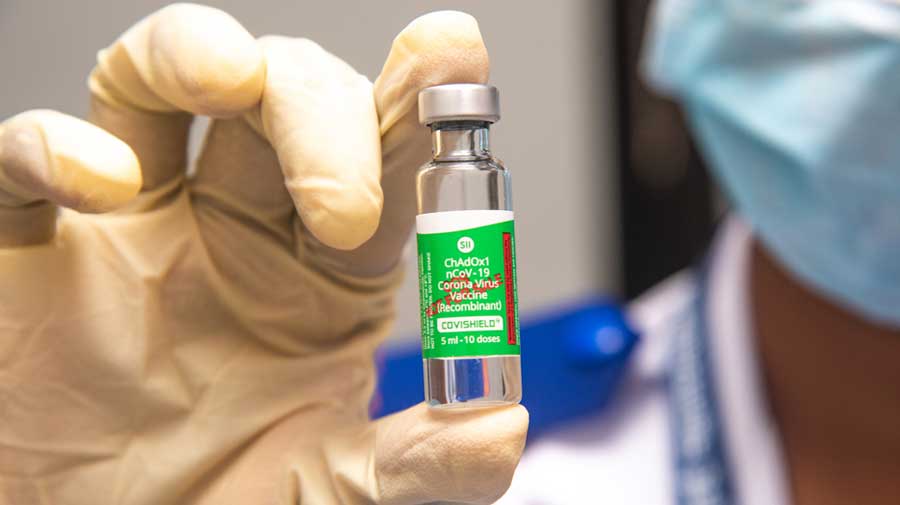
Indians receiving Covishield run 'tiny risk' of clotting or bleeding
26 suspected thromboembolic events had been observed in 68,650,819 doses administered until April 3, which comes to 0.38 cases per million doses

The panel also said that no suspected thromboembolic events (clots forming in blood vessels, breaking loose and blocking other vessels) had been observed after the administration of Covaxin, the other vaccine currently used in the nationwide Covid-19 vaccination campaign.
The Union health ministry said the national AEFI (adverse events following immunisation) committee had observed a rate of 0.61 cases of thromboembolic events per million doses.
However, it also said that 26 suspected thromboembolic events had been observed in 68,650,819 Covishield doses administered until April 3, which comes to 0.38 cases per million doses.
Narendra Arora, a senior adviser to the panel, told The Telegraph he would clarify the mismatch between the two numbers on Tuesday. “There is no error, no discrepancy,” he said.
The health ministry said that AEFI data from across India had shown a “very minuscule but definitive risk” of thromboembolic events from Covishield vaccination.
Doctors and health officials have reaffirmed that the benefits of the vaccine — the protection it offers from severe Covid-19 — far outweigh the tiny observed risk. This is especially so because patients who develop Covid-19 are at high risk of death from clotting complications caused by the disease itself.
The Indian figure of 0.61 cases of thromboembolic events per million doses is much lower than the 4 cases per million doses reported by Britain’s regulatory authority and 10 events per million doses observed in Germany, the ministry said.
Earlier medical studies had found that the risk of thromboembolic events was almost 70 per cent lower in people of South Asian and Southeast Asian descent compared with populations of European descent.
The National AEFI panel said it had completed “an in-depth review” of 498 serious and severe events in vaccinated people, among which 26 were suspected thromboembolic events.
The panel said a digital platform tracking AEFIs had recorded over 23,000 adverse events among the 75 million vaccine doses administered in India until April 3, of which around 700 (9.3 per million doses) were classified as “serious or severe”.
The AEFI panel has not specified the number of deaths among these 700 events.
Vaccine recipients from several cities have, however, said they are unaware of how to report AEFIs.
A 21-year-old man in Delhi who had received Covishield on May 14, for instance, developed high fever and transient numbness in one hand and fingers on May 15 evening.
He recovered a short while after the family consulted doctors on the phone. But until Monday, the family had not been able to report the AEFI to health authorities.
“The AEFI reporting system appears to be a farce,” the boy’s mother told The Telegraph on Monday.
The mother had posted a tweet on May 15, tagging the health ministry, the Indian Council of Medical Research and the Serum Institute, asking for contact numbers or email addresses to report the AEFI.
“Two days have gone by, no reply yet,” she said on Monday.
Medical experts say a strong AEFI reporting system is critical for analysis. While the health ministry has directed all vaccination centres to inform recipients about telephone numbers where they could call if any AEFI emerged after the mandatory 30-minute waiting period, many recipients remain unaware of this reporting system.
The health ministry said it was “separately issuing advisories to healthcare workers and vaccine beneficiaries” to encourage people to be aware of suspected thromboembolic symptoms that occur within 20 days after Covid-19 vaccination and report to their vaccination centre.
The suspect symptoms include pain in the chest; pain in the limbs or on pressing the limbs; swelling in the limbs; multiple, pinhead-sized red spots or bruising of skin in an area beyond the injection site; persistent abdominal pain with or without vomiting; seizures in the absence of previous history of seizures; severe or persistent headache; weakness or paralysis of the limbs; persistent vomiting; blurred vision or a change in mental status.

0 Response to " Indians receiving Covishield run 'tiny risk' of clotting or bleeding"
Post a Comment
Disclaimer Note:
The views expressed in the articles published here are solely those of the author and do not necessarily reflect the official policy, position, or perspective of Kalimpong News or KalimNews. Kalimpong News and KalimNews disclaim all liability for the published or posted articles, news, and information and assume no responsibility for the accuracy or validity of the content.
Kalimpong News is a non-profit online news platform managed by KalimNews and operated under the Kalimpong Press Club.
Comment Policy:
We encourage respectful and constructive discussions. Please ensure decency while commenting and register with your email ID to participate.
Note: only a member of this blog may post a comment.